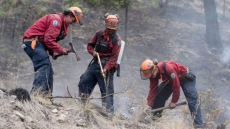A statistical analysis of the Conservative government's changes to environmental laws and procedures suggests Ottawa has "all but abandoned" attempts to protect Canada's lakes and rivers.
"Over the last decade, what we've seen is a not-so-gradual abandonment of the fish habitat protection field," said University of Calgary law professor Martin Olszynski.
He has sifted through reams of data and dozens of development applications to conclude that federal protection for fisheries and waterways has been declining for more than a decade.
Olszynski found environmental oversight by the Department of Fisheries and Oceans dropped dramatically during the 2000s — a time when Canada saw huge spending in the resource industries.
And he concludes changes to environmental law in 2012 weren't intended to cut red tape, as the government suggested, but to lower the environmental bar.
"What my data suggests is that the narrative provided doesn't add up in terms of this unduly intrusive regulatory regime. It was never really about reducing red tape."
Fisheries and Oceans was not immediately available for comment.
In a paper for the Journal of Environmental Law and Practice, Olszynski shows the number of proposals to the department's Central and Pacific regions fell to fewer than 4,000 by 2014 from more than 12,000 in 2001.
The drop came in two stages.
In 2004, the government decided to minimize oversight for projects deemed low-risk, which cut the number of projects it reviewed in half. The rest of the decrease came in 2012 after the government revamped environmental laws.
Over that same period, enforcement fell off a cliff.
Olszynski reports that environmental warnings and charges under the Fisheries Act fell to about 50 from about 300. Staff time allotted to enforcement dropped to 10,000 hours from 35,000.
The department's budget was cut by $80 million in 2012. Another $100 million in cuts are planned over three years beginning this year.
The analysis shows officials are granting approvals without seeing a developer's plans to fix any problems, despite federal law that says such plans must be approved before a project goes ahead. Olszynski's suggests most approvals are now granted with the understanding a developer will file a plan later.
Meanwhile, records show that the pace of development on rivers and lakes has kept roughly stable. A number of studies and peer-reviewed papers have also documented rapidly increasing impacts on forests and waterways.
The federal government has argued it's getting out of the regulatory end, so provinces can take over and duplication is reduced.
Olszynski said that if red tape alone had been the issue, it should have been solved in 2004 when Ottawa first backed off overseeing some projects.
He writes: "(Department of Fisheries and Oceans) appears to have been exemplary in reducing the administrative burden on proponents carrying out what it deemed to be low-risk activities.
"Rather, the problem appears to have been substantive; government (or) proponents, or both, deemed actual compliance (i.e. avoidance and mitigation of impacts to fish habitat) too burdensome."
Provincial approvals for development projects still have to abide by federal law. Olszynski said his analysis shows the department doesn't even see many of those proposals.
Scaling back assessments for low-risk developments can be a valid way to reduce regulatory burdens, Olszynski said. But to work, he said, it requires credible oversight and enforcement.
"DFO says we will reduce the burden on you, but you still have to comply with the act. What evidence is available suggests that industry did not keep their end of the bargain.
"The strong deterrent signal wasn't there ... in terms of enforcement."





